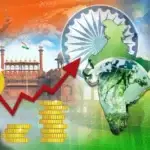Reform, transform and perform is the mantra that will fuel India’s grand standing as a developed nation by 2047
Rohan Giri
India’s Independence Day holds immense significance as it commemorates the nation’s liberation from British colonial rule while embodying its journey to realize 1.4 billion people’s dreams.

Prime Minister Narendra Modi address on this special day unveiled a plan to put India on high growth trajectory. Modi painted a compelling portrait on India’s future drawing inspiration from her classical civilizational roots. He set a resolute goal for India to attain developed nation status by 2047.
On 77-th Independence Day, Prime Minister began his address by referring to the turmoil and violence in Manipur and its impending resolution. He emphatically stated, “The country stands with the people of Manipur… Resolution is possible only through peace. The Centre and the state government are making all efforts to find a solution, and will continue to do so.”
While the state was limping back to normalcy, a lot more needs to be done for making Manipur home to diverse tribes living in harmony moving away from conflict, violence, women’s abuse, pain and suffering of various tribes.
Narendra Modi moved on to point the pivotal significance of undertaking economic reforms to fortify India’s global standing. As evident, India’s economy, valued at a staggering $3.5 trillion surpassed that of United Kingdom last year securing its place as fifth-largest in the world.

With unwavering conviction, he declared India’s resolute trajectory to ascend into the elite club of top three global economies in next five years.
Prime Minister heralded a noteworthy accomplishment – uplifting over 130 million individuals from strangle hold of poverty. He emphasized that India’s burgeoning prosperity serves as a compelling opportunity not only for the nation itself but for entire global community. Modi’s persistent emphasis on these aspects underscores his unequivocal dedication to harnessing India’s demographic dividend and steering it to transform into an economic powerhouse.
India is swiftly advancing on development path, garnering significant global recognition for its burgeoning expansion. Modi as Prime Minister, it is both commendable and imperative to nurture aspirations for a resplendent future. Contemplating the trajectory of India’s future, Modi affirmed, “I am confident that in 2047 when India marks 100 years of its Independence, it will be a developed nation. I say this on the basis of the capability of my country and available resources…”
Realizing the vision for a fully developed nation demands collective effort necessitating certain sacrifices from each citizen. Prime Minister emphasized, “We have to fight three things now — corruption, family rule, and appeasement. These create impediments to people’s aspirations while corruption has badly affected India’s capability. Modi has rightly targeted fighting against corruption as a key area. While politics of appeasement has inflicted most harm on social justice, the country has to resolve not to tolerate corruption in any form.
Global arena not only acknowledges ingenuity of Indian leadership but recognizes strength of the country’s core philosophy. Rooted in India’s philosophical moorings, this perception of entire humanity as one family stands out differently. In the aftermath of the Covid-19 pandemic, India presented a resonant principle: “One earth, one health.” This principle acted as a beacon of hope for afflicted nations.
In the aftermath of Covid-19 pandemic, the imperative for comprehensive healthcare has come to the forefront. This need has sparked a noticeable surge in the global embrace of traditional Indian healthcare practices such as indigenous medicine, yoga and meditation.
Notably, yoga, an amalgamation of physical, mental, and spiritual practices rooted in ancient India has seamlessly woven itself into the daily routines of people across the globe. Moreover, India’s healthcare systems including Ayurveda, Yoga and Naturopathy, Unani, Siddha, Sowa Rigpa and Homeopathy, progressively garnered global recognition.
Presently India is leading the G-20 as the Chair and espoused a grand vision encapsulated by the mantra “One Earth, One Family, One Future.” This profound perspective serves as comprehensive remedy to current challenges like war in Ukraine and forms the bedrock for harmonious and prosperous global coexistence in times to come.
The landscape of world order and geopolitics is undergoing swift transformations. New Delhi has engaged with the world powers in new ways by building alliances, strike trade deals and increases defence cooperation. On reshaping global order, Narendra Modi underscored, “In shaping a changing world, Indian people’s capabilities are evident… India’s biggest capability is trust — people’s trust in the government, the country’s bright future and the world’s trust in India. The ball is in our court, and we should not let go of opportunity; no ifs and buts on anyone’s mind about India’s capabilities.”
Prime Minister’s 90-minute address also delved into subjects like democracy, women-driven progress and space technology to novel schemes and pressing concern of terrorism.
His speech was a clarion call for people to embrace principles of Reform, Perform, and Transform. His vision for a reformed, efficient, and self-reliant India reflects well with aspirations of millions of Indians.
As the country navigates its path to progress and prosperity, the roadmap in Modi’s speech provides a framework to guide India’s journey into the future.
(Author is Operations Manager at Centre for Integrated and Holistic Studies, a New Delhi based non-partisan think tank)

